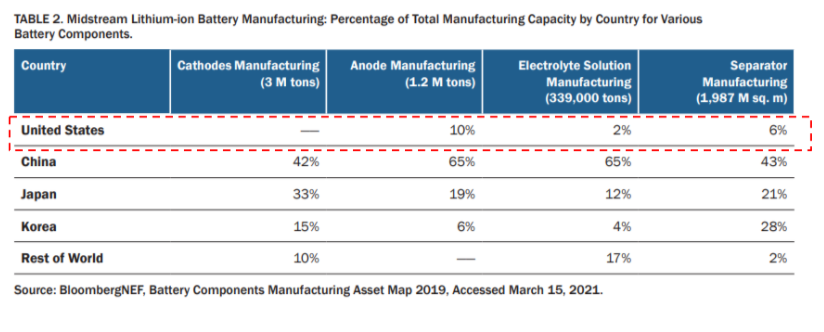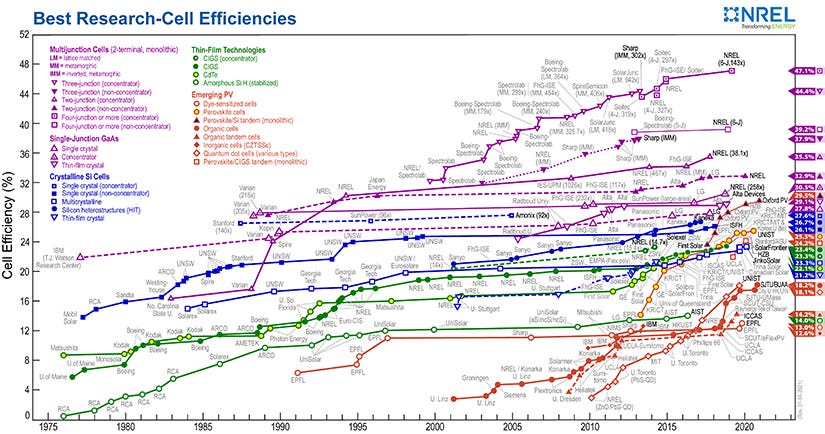Are you a [climate] coward or hero?
Plus, lithium as a national security issue? 99 more climate solutions. Question everything (aka, nullius in verba). Solar efficiencies (graph). Act now or be eaten.
Lithium, cobalt, nickel...Oh my!
If BloombergNEF is right, and we see $620B invested in batteries globally by 2050, then these statistics might worry us ‘mericans.
We are endowed with…
<1% of global cobalt reserves
<1% of global nickel reserves
3.6% of global lithium reserves
14.1% of global manganese reserves
0% of global cathode manufacturing
2% of global electrolyte solution manufacturing
6% of global separator manufacturing
10% of global anode manufacturing
To see how the U.S. might change this situation going forward — that is, to create more energy resilience, green jobs, Elon clones, etc. — check out the U.S. Department of Energy’s June 2021 report: “National Blueprint for Lithium Batteries.”
Solar efficiencies: You’ve got it all wrong.
When you look at this enticing graph below from NREL, you might think that the solar sector is drowning in technology risk, or that solar panel efficiency improvements have been the key to the solar revolution, which is part of the roughly $3T invested in renewable energy globally since 2010.
But you’d be wrong.
As many of you know, the real reason has to do with solar’s cost — that is, the Levelized Costs of Energy (CapEx + OpEx / total power produced) — falling 90% since 2009.*
* To be fair, efficiency plays a role in calculating LCOE, but the bigger factors are falling CapEx.
—
Why am I talking about this?
To remind us of this question — Are we paying attention to the right thing?
Or are we instead unconsciously obsessed with…
Popular beliefs about business strategies that should work?
Tactics that are the simplest to teach a large team?
Problems that are the easiest to diagnose?
For a mental model refresh, consider the benefits of contrarian thinking — i.e., doing the opposite of what peers are doing.
As examples…
Watch IKEA’s video parody of Apple’s product release videos.
Consider Techweek, which became a leading technology conference by highlighting cool stuff happening outside of Silicon Valley. (tech blasphemy!)
100 solutions — Do you feel climate FOMO yet?
I’m referring, of course, to the massive untapped opportunities on the Project Drawdown list.
It’s easy to be enamored with renewable energy and electric vehicles. They are certainly among my favorite children.
But, the more exciting question is this:
Which of the other 100 climate solutions (below) are going to become the next multi-billion-dollar industries that are bankable, insurable, and financeable?
Act or be eaten — Close the Excel spreadsheet.
As a PhD, you may think this is an example of the pot calling the kettle black.
Trust me. I’ve had to unlearn some things to make my home in new ventures and finance.
The questions for you and your team are these:
Are you really working on that important project of yours?
Or are you just getting ready to?
Writer James Clear puts it this way:
“Planning and preparation are useful until they become a form of procrastination.”
“Is this task enhancing my actions, or substituting for them?”
Another entrepreneur put it this way: There are two halves to any new venture:
Getting started
Everything else
In which half are you? How about your senior leaders? And your newer employees?
Nullius in verba — No, it’s not a Latin cuss word.
This is the motto of the Royal Society, formally The Royal Society of London for Improving Natural Knowledge, founded in 1660.
It means — “Take nobody's word for it."
Which is awfully similar to a lesson I learned in private equity — “Trust but verify.”
So, as we have just passed the half year mark, maybe it’s a good time to ask ourselves:
Which of our beliefs, visions, strategies, and tactics should we be questioning in order to reassess their relevance? Try picking 3-5 this weekend, attack them like a benevolent devil’s advocate, and reassess to see if they’re still valid.
Instead of jumping to reasons why something will not work — which is a frequent bias for us finance or engineering types — how about asking instead, “How could this work?” or “What if this worked?” It’s probably not a coincidence that industry builders or category creators are often good at asking these kinds of expansive questions.
That’s all, folks.
Make it a great week, because it’s usually a choice.
— Chris
P.S. Are you a hero or coward?
“What is the difference between a hero and a coward? No difference. Only what you do. They both feel the same. They both fear dying and getting hurt. The coward refuses to face up to what he’s got to face. The hero is more disciplined and he fights those feelings off and he does what he has to do. But they both feel the same, the hero and the coward. People who watch you judge you on what you do, not how you feel.”
― Ben Horowitz, The Hard Thing About Hard Things: Building a Business When There Are No Easy Answers
—
Dr. Chris Wedding
Founder and Chief Catalyst, Entrepreneurs for Impact
Peer-to-Peer Advisory Groups + Executive Coaching + Investor Intel for Climate CEOs
—
Join the waiting list for our next Climate Mastermind: Apply here
—
—
Securities offered through Finalis Securities LLC Member FINRA/SIPC. IronOak Energy Capital and Finalis Securities LLC are separate, unaffiliated entities.








